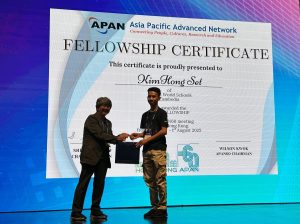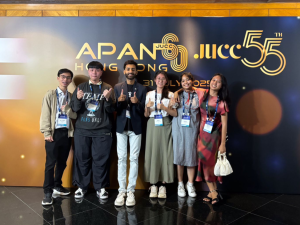From August 25 to 30, 2024, I had the privilege of attending the APAN58 conference held at the prestigious Serena Hotel in Islamabad, Pakistan. As an APAN58 fellow, I joined a diverse group of individuals, ranging from postgraduate students to professionals and researchers, all of whom were deeply committed to advancing networking and technology. The fellowship offered an invaluable opportunity to collaborate, exchange knowledge, and form meaningful connections with fellow attendees and the global research community.
A Step Towards Global Networking
In a country like Pakistan, it has always been a challenge for students and researchers to gain access to international networking opportunities. Traditionally, the lack of platforms connecting local academia with global researchers and industry leaders has been a significant barrier. APAN58, hosted by the Higher Education Commission (HEC) of Pakistan in collaboration with the Pakistan Education and Research Network (PERN), marked a major breakthrough in overcoming these barriers. The conference brought together participants from across the ASIA-PACIFIC region, providing a unified platform for the exchange of ideas and technological advancements.
The week-long event was filled with insightful sessions, workshops, panel discussions, and social activities—all aimed at fostering collaboration, enhancing research, and building connections. Through the fellowship, I was able to participate in numerous workshops and seminars, engage with experts in various fields, and gain exposure to the latest developments in networking, cybersecurity, artificial intelligence, and more.
Exploring the Power of Collaboration
One of the main highlights of APAN58 was the emphasis on collaboration among universities, industries, and international networking organizations. This was evident through the diverse working groups and special interest groups (SIGs) that were organized throughout the conference. I had the opportunity to be a part of several sessions, each focusing on key topics such as networking infrastructure, cybersecurity, AI-driven networks, IPv6, and the challenges of establishing sustainable digital solutions.
The sessions were led by experts from renown organizations, who shared their insights and experiences on building and maintaining robust and resilient networks. I was particularly impressed by the discussions on the integration of AI in network management, which emphasized the importance of developing intelligent and adaptive network infrastructures to meet the growing demands of modern technologies.
The collaborative spirit of the conference was not only limited to the formal sessions; the informal interactions during the coffee breaks, social dinners, and cultural activities also provided a wonderful opportunity to connect with fellow participants. These interactions were instrumental in building lasting relationships that I believe will greatly benefit my academic and professional journey in the future.
Workshops and Key Insights
As a fellow specializing in cybersecurity, I found the workshops on cybersecurity and AI particularly enriching. One standout session was conducted by Dr. Agha Ali Raza, who delivered an insightful keynote on “Demystifying Generative AI.” His presentation delved into the potential applications of generative AI, showcasing real-world examples and providing practical insights into leveraging AI for academic and professional purposes. It was fascinating to see how AI technologies, such as ChatGPT, can be used to solve complex academic challenges, and this knowledge will undoubtedly influence my future research endeavors.
Another engaging session was led by Huawei, which focused on the “Intelligent Education Campus Network” and highlighted the transformative power of digital technologies in the education sector. The presentation demonstrated how the adoption of smart Wi-Fi technologies and cloud-enabled educational innovations could revolutionize classrooms and improve learning outcomes across Pakistan. It was inspiring to envision how such advancements could contribute to the educational development of underserved communities in the country.
Networking Beyond Borders
The highlight of the fellowship was the opportunity to interact with an incredibly diverse group of individuals, including international researchers, local experts, and representatives from various national research and education networks (NRENs). APAN58 provided a space for these individuals to come together, share their research, and discuss strategies for fostering collaboration across borders.
The social activities, including the cultural night and social dinners, were another significant aspect of the fellowship. These events not only showcased the rich cultural heritage of Pakistan but also provided a relaxed setting for informal discussions and relationship-building. The warmth and hospitality extended by the local organizing committee made international fellows feel at home, and the cultural exchanges further strengthened the bonds among participants.
Reflecting on the Success of APAN58
As I reflect on my experience at APAN58, I am filled with a sense of pride and gratitude. The conference was a remarkable success in connecting international scholars, industry leaders, and local students, creating a more integrated and collaborative academic environment. The sessions were well-organized, the speakers were engaging, and the atmosphere was conducive to meaningful discussions and knowledge exchange.
The dedication of the HEC and PERN teams in organizing such a large-scale event was evident in every detail—from the logistics and accommodations to the smooth execution of the sessions. The commitment to ensuring that participants had a productive and enriching experience was commendable, and I am confident that APAN58 has set a new benchmark for conferences of this nature in Pakistan.
One of the most exciting developments shared during the conference was PERN’s plan to establish local APAN chapters across various universities in Pakistan. These chapters will provide students and researchers with greater access to networking opportunities, working groups, and training programs, ultimately contributing to the growth of a strong academic and professional community in the country.
Conclusion
The APAN58 conference was more than just a series of meetings and presentations—it was a transformative experience that allowed me to expand my horizons, build valuable connections, and gain insights into the future of networking and technology. As a research scholar focusing on cybersecurity at the Australian National University, the knowledge I gained from this fellowship will undoubtedly influence my research and guide me in addressing the challenges of the digital age. I am deeply thankful to the APAN Fellowship program for providing me with this opportunity and to the HEC and PERN teams for their dedication and hard work in making APAN58 a reality. I look forward to continuing my collaboration with the APAN community and contributing to the advancement of networking and technology in Pakistan and beyond.








